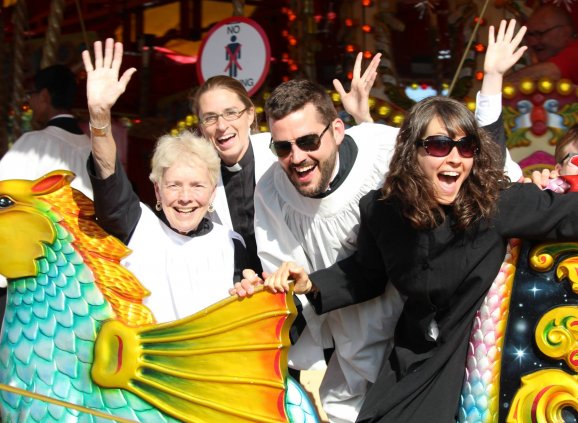
- Vested Interest
Doing Things Together: The Trinity Choirs Return From England

If you came this way,
Taking any route, starting from anywhere,
At any time or at any season,
It would always be the same: you would have to put off
Sense and notion. You are not here to verify,
Instruct yourself, or inform curiosity
Or carry report. You are here to kneel
Where prayer has been valid.
-T. S. Eliot, Little Gidding
The Choirs of Trinity Church have returned from England. The suitcases are unpacked; the souvenirs given as gifts, or tucked away for Christmas presents, or hung proudly on the wall, to be looked at until we forget to look any longer. The sixty-six black choir folders, psalm binders, and vestments are wending their slow way back to St. Andrew’s Hall, to be sorted and hung up and put away. After two intense weeks of singing, praying, rehearsing, eating, and living in community together, we have gone our separate ways.
How do we talk about this experience? How do we integrate it into the rest of our lives? Even for those few of us who are professional musicians or church employees, this was an immersion into a radically different way of living.
We sang, first in Westminster Abbey, and then in Winchester Cathedral. Both churches are former Benedictine monasteries whose sites as places of worship predate the buildings themselves. Both buildings have hosted daily prayer, virtually uninterrupted (except, in the Abbey’s case, during the British Civil War) for nearly a thousand years. It was our privilege as a choir to lead this prayer for two weeks. We sat in the choir stalls in Winchester which were carved by masters in the thirteenth century. We sang the music of Stanford and Howells in the cathedral where they lie buried. We didn’t just dip our toes into the great river of Christian tradition; we dove in, and let the torrent carry us.
It was not easy. We sang for between two and five hours per day—usually closer to the latter. There was some sightseeing, but this was sandwiched into the breaks between rehearsal and Evensong, competing with the need to eat, shower, change, and perhaps even take a nap during those precious few hours. Most of us got sick at some point, and most of us were hard-pressed to protect our voices. The music was intellectually and vocally demanding; even on “easy” days there was a new Psalm chant to learn, and every day it took each of us what Richard Webster calls “brains on fire” to sing as a cohesive group.
A choir, by definition, does things together—and we certainly fit the definition. From pre-teens to retirees, we navigated unfamiliar cities together, scoped out places to eat together, made up endless inside jokes, lost our tempers with one another (and then regained them), made allowances for one another, and tried our very best to walk in straight lines during processions. We carried one another’s bags and took one another’s temperatures, lent one another money and stood one another drinks. A choir does things together; and to my way of thinking, a choir is simply one particular mode of entering into the Christian life. By learning to sing together, we learn to live together. By learning to live together, we learn to see and embody Christ in one another.
And so I wonder: what would it look like for me to try to carry some of these ways of being forward into my life? How can I continue to draw on the joyful intensity of these two weeks? I don’t anticipate being able to spend several hours a day singing for the foreseeable future. But I can begin in two ways: first, I can dive more deeply into my own daily prayer practice, spending more time with the Psalms each day. The cycle of Morning and Evening Prayer was designed primarily for us to spend significant devotional time with these key texts. And second, I can invest more deeply into my own family, community, and city. Whether we’re living in the same studio apartment, sharing the same historic church space, or inhabiting the same tiny spot of land on the coast of the Atlantic Ocean, we must learn to live together. The goal of our shared existence is less focused, less easy to conceptualize, than a killer rendition of Leighton’s Second Service, but it’s ultimately working toward the same end: we must recognize Christ in one another, and be Christ to one another. And doing this will demand that our brains, along with our hearts, be on fire.
At "Vested Interest," church nerd Mary Davenport Davis explores all things liturgy and music at Trinity and beyond. Chime in with comments and questions!


Comments